19th Annual Great Defender of Life Dinner
Anne Manice:
Thank you [Jim McLaughlin] for your kind introduction. Thank you, Maria. I remember when you were thinking of taking on the Human Life Review after your father’s death, I said, please continue it because you’re our intellectual sustenance. We’re in the field, and on weekends we read the Human Life Review to be stronger for Monday. So, thank you, Maria, for continuing the Human Life Review.
A pregnancy center—what is it, and what do we do? We’re the very first contact. We’re the frontline. We’re just a voice sometimes. And the voice we train for months, just to learn how to say, “Hello, may I help you?” We know that the woman on the other end of the line is nervous, she’s scared. She has probably just done a pregnancy test, maybe two. And every fiber of her being knows that nothing will ever be the same in her life. She hasn’t decided yet if she’s going to tell her boyfriend, her mother, the people around her. She’s lost. At our end, at the end of the pregnancy center, we know there’s a life, the life of a child, at stake, and also the life of the mother—her spiritual life. We know that. And we also know that it’s going to take everything we’ve got to save them both. We know that. We really are at the frontline of this enormous national conversation that has shaken the American soul since 1973.
Because, when a pregnancy is there, it’s no longer about if the mother is pro-life or pro-women’s right to choose. For her, it’s really about “What am I going to do today, who am I going to tell, how am I going to make it through the next week?”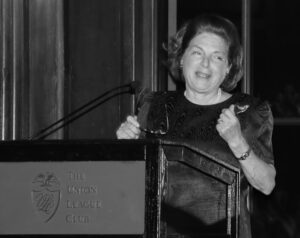
Pregnancy Help opened in 1994. It was quite funny that we were renting the front office of a Jewish foot doctor on West 14th St. When I explained to him what we were going to do, I said, “Well, we help women.” With a broad, reassuring smile, he said, “Well, help them from here.” So I signed a lease with him. He had a very foggy idea about what we did, but he liked us, and we had a wonderful 25-year relationship with him.
It’s been almost 30 years since then. Over 30,000 women have contacted us. And, I think we can safely say that there are over 5000 children alive today because their mothers called Pregnancy Help. Last June, I was walking down Second Avenue, and a voice says “Anne Manice.” This woman, sitting at a table having coffee, was Christie, our very, very first client. Her daughter Rosa Sophia is a graduate of Hunter College. She showed me a picture of her, and we have each other’s cell-phone numbers.
In those early years, we advertised in the (now defunct) yellow pages and in El Diario and other daily papers. But I am here tonight to introduce you to Nicole Moore, who is now the Director of Pregnancy Help. She reaches out to needy women on the Internet, on Facebook and Instagram. Nicole has even counseled women on Zoom! Things we couldn’t imagine twenty years ago.
Last week, Nicole called me about a small matter. My husband and I were driving upstate, and within minutes of our conversation the tone of her voice changed: “Anne,” she said, “this summer we saved four babies.” My heart skipped a beat—good thing I wasn’t driving—and I knew that the work of Pregnancy Help continues strong and well in the hands of Nicole. So, thank you, Maria, for tonight. And thank you, Nicole, for being today’s warrior for life.
____________________________________________________
Nicole Moore:
I’m not much of a public speaker, so this is not going to be very long. But I want to thank all of you for being here to support Pregnancy Help,Inc. Your support is so appreciated, because I can tell you firsthand that working in the frontlines is—it can be very isolating. And very difficult, in the sense of day in and day out seeing women in difficult pregnancies, seeing how real the threat of abortion is in their lives, and seeing why they even consider abortion in the first place. It’s kind of easy to get caught in that darkness of “Oh, my gosh, this city is steeped in sin and darkness, and is there hope for these women?” And even when you are counseling them, you realize that you’re probably the only voice in their life telling them, “You can keep this baby, you can do this.” And so just seeing all of you here present tonight, it’s encouraging to know that, okay, there are people who believe in life, there are people who believe that the unborn child matters. So, thank you all for your support.
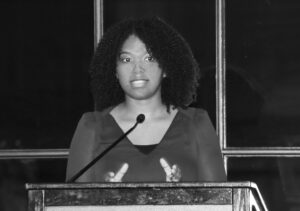 But I would argue that the support should continue. It doesn’t end here. We did have the beautiful victory of Roe being overturned, but the reality is here in New York nothing has changed. Abortion is still legal through nine months. I have women who are hitting 23 weeks of pregnancy, who are calling me saying that they are considering aborting their child. And so, the reality is we still have a lot of work to do here. While other states are celebrating, maybe taking a step back and resting in the victory, we don’t have that luxury. We have to keep on fighting.
But I would argue that the support should continue. It doesn’t end here. We did have the beautiful victory of Roe being overturned, but the reality is here in New York nothing has changed. Abortion is still legal through nine months. I have women who are hitting 23 weeks of pregnancy, who are calling me saying that they are considering aborting their child. And so, the reality is we still have a lot of work to do here. While other states are celebrating, maybe taking a step back and resting in the victory, we don’t have that luxury. We have to keep on fighting.
And God is good. Even in the midst of the barbaric laws of our state, since the end of Roe v. Wade, I can tell you, there’s been a change in the hearts of the women who are calling. Yes, they may be calling asking for an abortion, but when I suggest to them, “Well, have you considered another option?” their heart is open. So, yes, we had the legal victory, but I think spiritually something is going on. It’s no coincidence that Roe v. Wade was overturned on the Feast of the Sacred Heart of Jesus.
God is good all the time. And so, we keep on fighting. You support in whatever way you can. If it’s monetarily . . . if it’s being physically in front of abortion clinics, sidewalk counseling . . . if it’s volunteering in a crisis pregnancy center . . . if it’s reporting the real news about abortion, not fake news—we thank you for your support. Just remember that the fight continues. And know that even though it is still dark here in New York City, there is light, and that women are choosing their children. And again, thank you everyone.
___________________________________________________
Helen Alvaré:
Good evening. it’s a pleasure to see so many beautiful and friendly faces. I’m really honored that I have the honor of introducing Gerry. I don’t know what I did to deserve this. But I will try to do him justice.
Gerard V. Bradley—I take it the V is for victory, Gerry, because you make me put it in your email all the time. It’s always Gerard V. He is a giant of a man in more ways than one. I think I’ve known of him at least since the 1980s. First by way of his scholarship, which dates back to that period, and then in pro-life circles, and now as an academic colleague. But before and through all of that, I always knew that Gerry and his wife Pam were this amazing family. We just missed each other at Cornell Law School, by a year, Pam and I, and Gerry by a couple of years. He’s a wonderful father and family man. You must know this Pam, I’m sure, that when people would ask Gerry when he was travelling how many kids he had, he used to say, “I have to call home and check the situation and I’ll let you know.”
Also, my daughter, who is at Notre Dame, lived across the street from one of their children—Michael and his wife—and I can tell you that if Michael is an example of the family that Gerry and Pam have raised—this is impressive stuff, and an absolutely beautiful family.
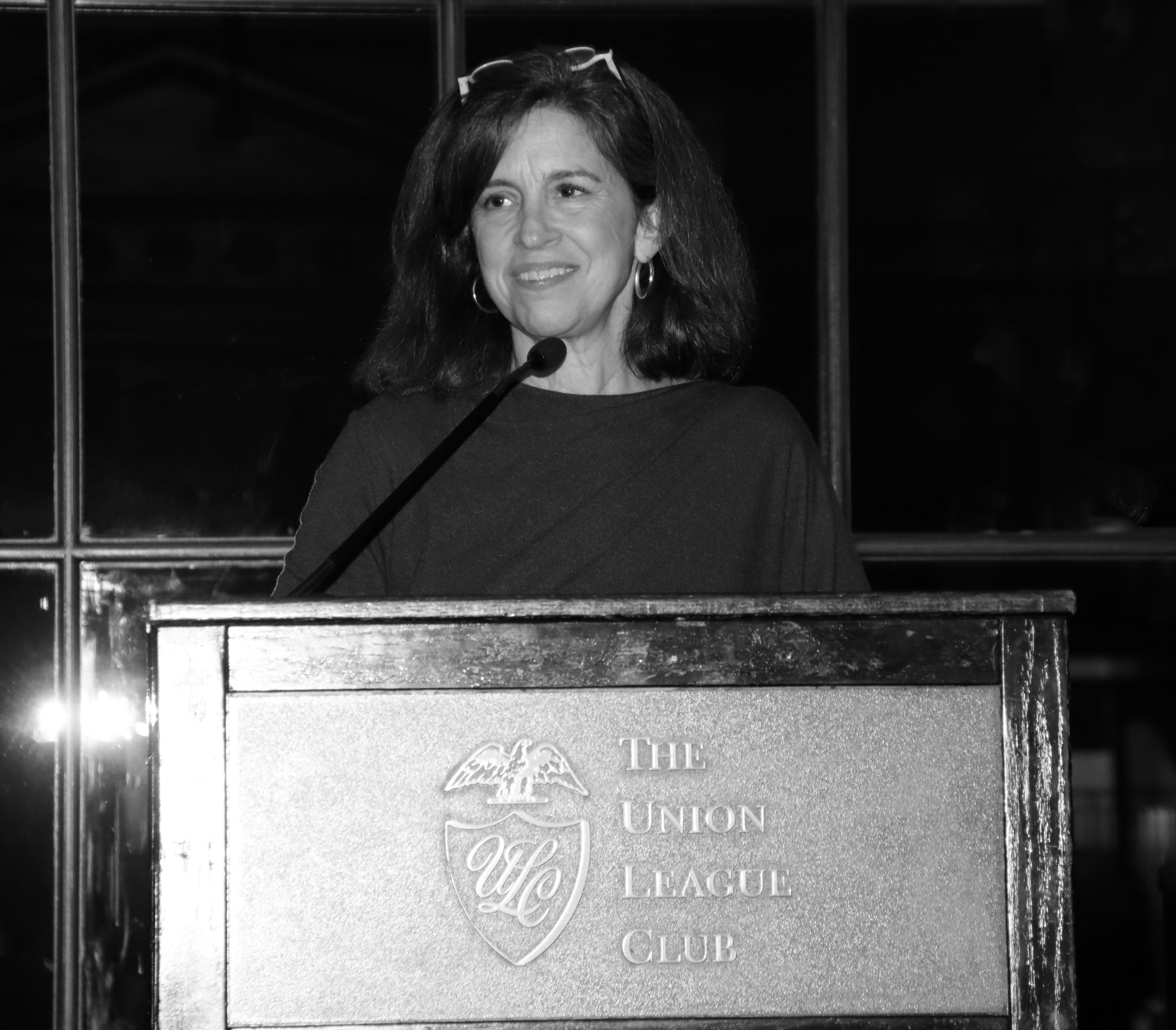 If I had to briefly—and Gerry has had a long career—but if I had to briefly characterize Gerry—I would characterize his role in the pro-life movement using the images of a rock, a lighthouse, and a refuge. Please don’t laugh because it came to me in a flash, and I think it’s true!
If I had to briefly—and Gerry has had a long career—but if I had to briefly characterize Gerry—I would characterize his role in the pro-life movement using the images of a rock, a lighthouse, and a refuge. Please don’t laugh because it came to me in a flash, and I think it’s true!
He’s a rock, because in season and out, decade after decade, no matter how the academy is swinging, no matter what direction even Catholic universities are swinging, no matter whether we’re on a winning streak or losing streak, Gerry stands firm. We can expect rock-solid reasoning and conviction in everything that flows from his pen.
I also think of Gerry as a lighthouse, not just because he is super tall, but also because his scholarship is amazingly illuminating. He is a significant part of the pro-life intellectual movement that this country has been lucky enough to have for decades. It’s no surprise for anyone who’s at a dinner for the Review, that the pro-life movement has a significant intellectual tradition. What happened in Dobbs was a logical product of this intellectual tradition. The movement didn’t just do populist things, we didn’t just take our cause to the streets, we didn’t just do all the wonderful work we accomplished at the crisis pregnancy centers, and the enormous legislative work we accomplished at both the state and federal levels. We did our homework as scholars too. And Gerry is one of the brightest stars in that firmament.
I believe the movement’s intellectual prowess needs to be stressed again and again in the current stage of our victory, because I think those who are on the other side of this issue—ironically those who deny science, human rights, and logic—will tend to claim the intellectual mantle for themselves, and all the academic honors. But it is Gerry who is a decade’slong star on the intellectual aspect of this debate, with dozens of articles and books on these subjects. And not just on the abortion issue—but also on natural law and other issues related to life or death, and on church-state relations as they interact with these issues.
I think he is also a lighthouse because even when we’re winning, even when we’re tempted to spend time appreciating our progress, Gerry says, “No, no, I see something further. I see the next stage.” I think the piece that he has in the most current edition of the Review illustrates this virtue, and is something that you should take a close look at. Because while we’re saying, “Oh, Roe versus Wade has been overturned!” Gerry is saying, “Wait a minute, the word “life” in the 14th Amendment protects the unborn. And here’s how I can make a legal argument for this, and here’s how Justice Alito gave us an opening for this argument, etc.” Gerry is a light that’s showing us that we can sail forward, even further forward than we might believe.
Finally, I would say that Gerry is a refuge. His success and his strengths— personally, familially, spiritually, intellectually—are a light to others and an assurance to them, to other scholars in particular, that it is okay to venture “out there.” His life communicates: “be truthful, be intellectually rigorous, be logical, and be not afraid. And you too can have a meaningful, happy, successful career—and a career in service to other people. You can write about some of the most contested things on the planet and live to tell the tale.” Gerry is telling us that it’s OK to be brave. And I know that he’s helped me (and some others) from time to time, when I just can’t take it anymore, when the slings and arrows just make me want to weep (and I do). Gerry has talked me off the ledge, and I’ll bet he has done it for a lot of other people as well. So, Gerry, on behalf of your academic colleagues, and, if I may, on behalf of all the students, the budding scholars, and all the members of the public who have never met you but whom you have helped, on behalf of all the children who are here but otherwise would not have been, thank you from the bottom of our hearts for your intellectual dedication. And thank you, Pam, for being with him from the beginning of his efforts. I know what it’s like to be in a relationship with a spouse who runs around and does pro-life things. And I know that one should always thank the family, and Pam’s own intellectual and personal commitment to the issue, as well as what the Bradley’s do together as a couple. So, thank you very much to Pam and to the whole family. And, Gerry, congratulations.
________________________________________________
Gerard V. Bradley:
I can’t summon the words to thank Helen enough for that introduction. Not only for what she said but that she said it. Fact is, I have long looked up to Helen as not only a “great” defender of life, but as an utterly fearless one too. Sincerest thanks to my friend and classmate Jim McLaughlin. For several years Jim and I have been saying that we need to get together for dinner in Manhattan. When he called a few months ago and suggested Oct 6, I said fine. Who knew that Jim would invite all of you to join us?
Thank you, Maria, and all your collaborators, especially Jane Devanny, for bestowing on me this honor. And thank you all assembled here for making the evening such a memorable one.
Frankly, I’m not sure I can summon words equal to the moment. For one thing, I am troubled by advice that a great man of Notre Dame, a great philosopher, and author of 95 detective novels gave me thirty years ago, as he pushed me onstage for my first after-dinner speech to a discriminating audience like this one. Ralph McInerny’s words to me that night in Corpus Christi, Texas, were: “Don’t worry. It doesn’t matter what you say—so long as you are very funny.”
As tonight drew near, I sought help from the funniest “great defender” of life I know, Hadley Arkes, your 2004 honoree.
If you have heard Hadley speak you know that he serves up natural law wrapped in Borscht Belt humor. He quotes in equal measure from Aristotle, Aquinas, Blackstone—and Ralph Kramden. Twice in the last few weeks I asked Hadley if I could borrow his joke book for tonight. Each time he just smiled and said: “You’re on your own, kid.”
He says that he keeps all the jokes in his head.
Hadley’s award was sandwiched between your dinners honoring Henry Hyde and Nat Hentoff. The Irish-Catholic Hyde possessed the looks and the resume of an American hero: college basketball, Navy service, political prominence. He will forever be remembered for the Amendment bearing his name. Hentoff was an entirely different sort of cat, most famously the jazz critic for the Village Voice. He was, according to one magazine profile of him, “the only Jewish, atheist, pro-life, libertarian hawk in America.”
Two very different men united by conviction, and in effort, to save the lives of our tiniest brothers and sisters.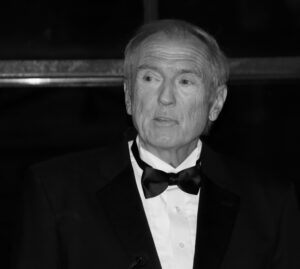
I am being honored tonight for what I have given to the pro-life cause. Fair enough. But the truth is that the cause has given me way more. The work I do is part of my calling, my vocation, my personal share in building up the everlasting Kingdom. It is how the Lord wants me to use my peculiar gifts for the good of others. Serving the cause has given me a certain confidence that I am doing what Jesus wants me to do. What more is there?
Well, the pro-life cause also helped deliver God’s greatest gift to me. Pamela Vivolo Bradley is my wife of forty-one years, mother of our eight children and grandmother of fifteen, including three in the womb. Pam was two years behind me at Cornell Law School. By her own account she was at first not much drawn to an insouciant 3L who skipped more classes than he attended. Then she saw him at daily Mass a few times. That helped. But her heart really softened when she heard that I was conspicuously pro-life.
We married while Pam was still in law school and moved to Brooklyn. Straightaway a college friend of hers came to visit. This young Catholic journalist, Pete Sheehan, announced that his cousin in Manhattan wanted us all to come over. Soon we pulled up to 1050 Park Avenue, dwelling place of the McFadden clan. Jim and Faith could not have been more gracious hosts to two strangers from across the East River.
That night, this son of a Brooklyn cop tasted caviar for the first time in his life. But we did not meet Maria. She was in France for the academic year.
Being pro-life has been a marital partnership for Pam and me. Still in her twenties Pam became President of the Birthright Chapter in Champaign, Illinois, my first teaching stop. She has given in so many ways since. Being pro-life thus profoundly shaped our family. Tonight, three of our children are here: Jennie, Kevin, and Anna.
My biggest worry about what to say tonight is the timing: It just so happens I am the honoree the year that Roe v. Wade was finally overruled. I stand in the place of countless other persons, many now dead and all of them absent tonight save you few. It is their night, not mine. I contributed an infinitesimal share to the work which bore fruit on June 24, 2022. No less but no more. How could I do justice in words to all those who in season and out of season labored to keep the flame of life burning bright these fifty years?
Yes, we justly celebrate the courage and legal skills of our Supreme Court justices. They did the right thing and have paid a price for it, in opposition, ridicule, even danger: Just weeks ago Amy Barrett returned to Notre Dame Law School to teach a week-long seminar. She could not move without a squad of federal marshals moving in tandem with her.
Then again, the justices were doing their jobs. They said in Dobbs that Roe was egregiously mistaken the day it was handed down. Indeed, it was. At any moment since January 22, 1973, you could easily have found five constitutional lawyers willing to overrule Roe v. Wade. The trick has been to get them onto the Supreme Court. That took a mass, grassroots movement, comprised of courageous and faithful people, forceful and even uncompromising, wholly dedicated to life. It was not their jobs. It was their way of being Good Samaritans, without recompense or recognition at least in this life. As a matter of fact: They—we—have accomplished something that no other country in the world has accomplished. Everywhere else on planet Earth where abortion sunk its tentacles into a legal culture, it never let go. Our law and our cultural elites swallowed abortion hook, line, and sinker a half-century ago.
But the American people spit it back out!
I do not think that this was humanly possible; it could not have happened without grace.
Jim McFadden did more than his share to keep the flame of life alive. It was not his day job either. And talk about modest beginnings: At the 2003 Great Defender of Life dinner Ed Capano recalled that “over a glass of Chianti and a couple of bowls of linguine with red clam sauce” shortly after Roe, he and Jim decided to do what they did best, which was publish. The result of that meeting was Lifeletter, a four-page newsletter. Two years later the first issue of the Human Life Review was published. Capano said that the Review became “the pro-life debater’s bible.”
Amen. In the Psalmist’s words, the Human Life Foundation has gone from “strength to strength” since that pasta repast, all the way to this huge gala. If Yogi Berra were here, he would probably say: “It’s just like the Parable of the Mustard Seed. Only bigger.”
We woke up on June 25, 2022, to a brave new world. Dobbs released constitutional law from its bondage to abortion. But this is 2022, not 1972. Roe v. Wade is dead. But its legacy is daunting, and likely to be stubborn.
One thing I noticed right away is that a lot of red-state politicians had wet their beds overnight. They were all saber and musket when being pro-life was cheap, because Roe made sure that the substance of the abortion liberty was sacrosanct. Then being a pro-life politician came cheap. Now the price for that, too, has gone way up. Lindsey Graham recently introduced in Congress a national ban on late-term abortion. Some Republicans are saying that, according to Dobbs, the federal government has no power to limit abortion. Nothing in that case supports this. Anyone who says otherwise is likely wearing Depends.
Even red states where the politicians have backbones also have judges. Dobbs cancelled the right to abortion Harry Blackmun muscled into the Due Process Clause. But pro-abortion judges are creative and, in their way, ruthless. They are looking for a right to abortion elsewhere in the Constitution, like in the Free Exercise (of religion) Clause. Extending that thought to ghoulish lengths, one federal judge in Indiana just threw out a state law requiring that fetal remains be given a proper human burial. That, this judge said, violated the religious freedom of those who believe that unborn people are not people, but instead that they are discardable medical waste.
The more ominous judicial moves after Dobbs are towards state constitutions. In my adopted home state of Indiana, in a special session this summer, the legislature enacted a substantial though not fully just prohibition on abortion. It has yet to take effect, because a state judge enjoined its enforcement. On what grounds? Article 1, section 1 of the 1855 Indiana Constitution, which says “all people are created [and] are endowed by their CREATOR with certain inalienable rights; that among these are life, liberty, and the pursuit of happiness.” Sounds good. But our judge held that “forcing pregnancy and childbirth upon thousands of Hoosiers” prevented them from enjoying the “Creator’s” gift to them.
This judge acknowledged that abortion was a crime when the Indiana constitution was ratified. No worries: “The significant deficits of those who wrote that constitution—particularly as they pertain to the liberty of women and people of color—are readily apparent . . . Our analysis cannot disregard this reality.”
Yes, you heard that right: The constitution that we actually have does not protect abortion. But the constitution that right-thinking people like me would have written, does.
This is not legal reasoning. It is judicial alchemy—in reverse: This judge made something base out of something noble and good. The judge is a Republican, by the way.
If it happened in Indiana, it could happen anywhere. Because these are state judges claiming to apply their state constitutions, the lethal rulings are beyond review by the Supreme Court, as would be the barbaric abortion laws in states such as California and New York—unless Dobbs does more than cancel Roe.
Is Dobbs a more pro-actively, more assertedly pro-life holding?
It should be: Every legitimate source of constitutional meaning—text, structure, history—says that the unborn are “persons” within the meaning of the Equal Protection Clause and, therefore, have the same right not to be killed that you and I have. Extraordinarily able briefs made precisely this argument to the Dobbs Court. If the Court took this position in Dobbs, we would be consuming the fatted calf this evening, because it would mean, practically, the end of legal abortion in America.
But Dobbs said nothing explicit about who counts as a “person” for Equal Protection. The majority said nothing about these briefs or the argument they made. Truth be told, even pro-life justices have long been averse to making what they call a “value judgment” about when people begin. This was the signature line about abortion of the late Justice Scalia.
It seems, then, that constitutional “personhood” is the White Whale of the pro-life movement. For the foreseeable future, trying to carry this citadel of justice by frontal argument, as we did in Dobbs, won’t work.
In fact, Dobbs consigned abortion laws to the lowest rung of constitutional scrutiny, typically a very lax standard, a sort of E-ZPass: Dobbs said that abortion regulations will be upheld “against equal protection challenge if any reasonably conceivable state of facts could provide a rational basis for the classification.” According to this judicial test, only laws that are “arbitrary” are unconstitutional.
The holding of Dobbs is nonetheless profoundly pro-life. The Court’s opinion opened a back door to personhood, another constitutional pathway to obtaining justice for the unborn. This route is governed by logic and undeniable biological fact, not by anything that looks like a suspect judicial “value judgment.” It shows that abortion kills a living, whole human individual who cannot rationally be distinguished from a baby or an infant or any other “person,” such as you or me. In other words: Homicide laws which treat the unborn child unequally are unconstitutional.
Here is the capsule version of a case I make at length in the current issue of the Human Life Review, a case sharpened by Anne Conlon’s expert editing. Dobbs recognized that whatever it is that gives anyone a right-to-life must be something about that individual and not about any external circumstance, such as “viability”—the capacity of available medical technique to keep one alive. Only what Dobbs called “characteristics of the fetus” count. What makes anyone a “person” is intrinsic, inherent, not extrinsic or accidental. This is exactly right.
Then the Court showed there is no defensible distinction among unborn children. “Viability” is, the Court concluded, an “arbitrary line.” The Court then turned to the rationality of distinctions between preand post-natal human beings. This “arbitrary line,” the Court wrote, “has not found much support among philosophers and ethicists who have attempted to justify a right to abortion. Some have argued that a fetus should not be entitled to legal protection until it acquires the characteristics that they regard as defining what it means to be a ‘person.’” Characteristics like “sentience, self-awareness, the ability to reason, or some combination thereof” are suggested to be such “essential attributes of ‘personhood.’” “By this logic,” wrote the Dobbs majority, “it would be an open question whether even born individuals, including young children or those afflicted with certain developmental or medical conditions, merit protection as ‘persons.’”
Well, then, here is the core, the beating heart, of pro-life litigation going forward.
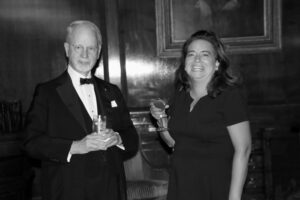
Ambassador Gerald Scott and Karina Short, wife of HLR contributor Edward Short
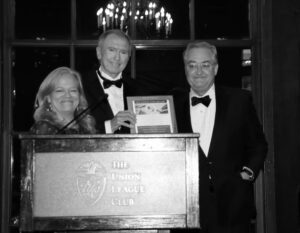
Maria and Jim McLaughlin present Mr. Bradley with the Great Defender of Life award
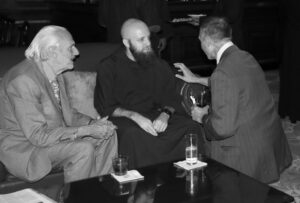
Raymond and Brother Gabriel Conlon, OFM Cap, chat with Chris Bell of Good Counsel
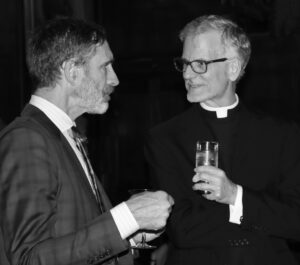
Rusty Reno and Rev. Victor Lee Austin
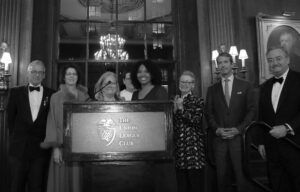
Members of Pregnancy Help, Inc. Board of Directors
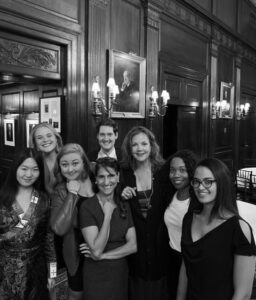
Feminists Choosing Life of New York
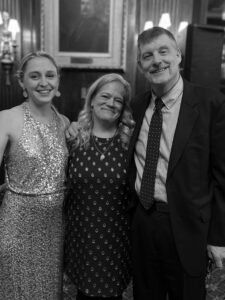
Mary Rose Smorraiba with Maria McFadden Maffucci and Edward Mechmann


